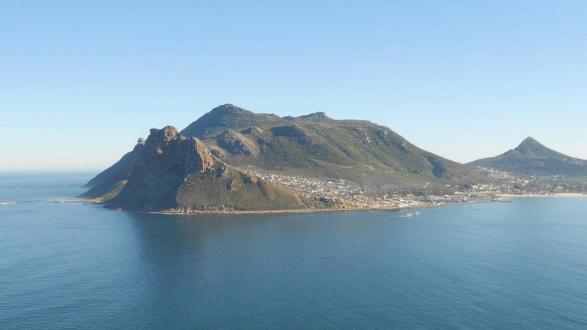On or around May 11—known as "Day Zero"—South Africa’s second-largest city of 4 million people, Cape Town, will have to limit water supplies to 25 liters per person per day, to be retrieved at one of about 200 locations that will be secured by armed guards. A severe drought is exacerbating the region’s water crisis, which could result in all residential water being cut off.
It is worth noting that the city for months encouraged voluntary restrictions and limits on water use, but only about half of the city’s citizens met those targets, and strict enforcement isn’t feasible. Planners set ceilings for water use, and cities and towns in the Eastern Cape (including Port Elizabeth, Jeffrey’s Bay, and Cape Town) have blown right through them. Earlier this month, the premier of the Western Cape, Helen Zille, wrote, "The question that dominates my waking hours now is: When Day Zero arrives, how do we make water accessible and prevent anarchy?"
I used to dream of moving to Cape Town. To me, it’s one of the most beautiful cities in the world, along with Wellington, New Zealand, and Seattle, Washington, the place I now call home. I’ve surfed Cape Town’s Muizenberg Beach and admired humpback whales in Kalk Bay while drinking my morning coffee. I daydream about the desert flowers in bloom, wine country, and the marvel of Cape Point, where the Indian and Atlantic Oceans meet.
The question I’m asking is whether Cape Town’s experience is indicative of the near future for many more of us around the world, or simply an anomaly.
As someone who has focused my professional life on issues relating to water security, the question I’m asking is whether Cape Town’s experience is indicative of the near future for many more of us around the world, or simply an anomaly. In fact, several cities have come close to becoming "the first city to run out of water." São Paolo was five months away from winning the dubious distinction in 2015. In 2007, Atlanta was staring down the barrel of a three-month water supply and few viable alternatives. These are but two of many examples.
We live in a world that is increasingly urban, and increasingly so in areas facing significant (and growing) water stress—and in a consumer capitalist economy where water isn’t valued in all of the many ways it supports life and livelihoods.
As with Sao Paolo and Atlanta, and many smaller cities before them, the culprit in Cape Town’s case is a long-term drought. The city (and province) does not have a diversified water supply and is dependent on rain. Many years into a long term drought in Australia, the country invested in a broad and expensive program of desalination to become drought-proof. And just as the facilities were coming on line, the rains came in force, and the facilities were moth-balled. Santa Barbara faced a similar conundrum.
We are collectively going water bankrupt due to decades of decision making and choices on water allocation and use, compounded by climate change.
Some blame the South African government for poor planning. There is a mood of anger and fear in the country: how could this happen in the 21st century? What will happen when I go to collect water? Will it be safe? What if my house catches fire? The truth is, few cities (if any) plan for absolute water scarcity. We are all complicit in believing the logic that charging more for water will drive efficiency and conservation, when in practice, what that often does is accommodate more population growth and use. Cape Town’s population has nearly doubled in the last 20 years.
We need to raise awareness about the threat water scarcity presents, and ramp up efforts to adapt to climate change. We need to have the courage to ask hard questions about population growth. Our current form of capitalism needs to evolve and account for water pollution and consumption. We need a shift in values, from 2,000+ years of believing that humans have dominion over nature, and stop pretending that we are not a part of nature, nor affected by the damage we cause to the ecosystems that underlie life on planet earth. We have to have the courage to change how we plan for, evaluate, and govern our infrastructure.
Time will tell whether Cape Town falls into anarchy or is saved by a few weeks of rain. Perhaps it too will end up like Sao Paolo and Atlanta, as near misses. As a global community, however, let’s not equivocate. We are collectively going water bankrupt due to decades of decision making and choices on water allocation and use, compounded by climate change. Whether we want to go bankrupt slowly and then all at once, or adapt to meet the challenge, should be front and center in our policy discussions.
_______________________
Rachel Cardone is the Pacific Council’s Global Water Scarcity Project Fellow.
The views and opinions expressed here are those of the author and do not necessarily reflect the official policy or position of the Pacific Council.




